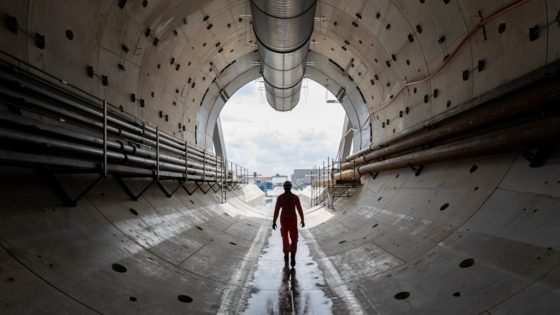Reforms to fast track major projects will see the creation of an infrastructure board within the government’s environment department and a single lead regulator to facilitate the delivery of major projects.
The government announced the measures in response to a wide-ranging review of environmental regulations to “accelerate the delivery” of projects after HS2 contractors were forced to create a controversial £120m bat tunnel to stop the mammals colliding with trains.
On Wednesday (2 April), former Gordon Brown advisor Dan Corry published a 64-page review with 29 recommendations.
Environment secretary Steve Reed has confirmed that nine key measures will be taken forward and “fast tracked”.
Among these is a pledge to establish an infrastructure board within the Department for Environment, Food and Rural Affairs (DEFRA).
Corry’s review urged this to include a “rolling, forward-looking pipeline of nationally significant infrastructure projects and other wider complex projects where relevant”.
DEFRA said the board will mean “greater collaboration and stronger oversight within DEFRA and its arm’s-length bodies – unblocking barriers to development at an early stage”.
The government will also adopt Corry’s call for a single, lead regulator for all major projects. This will stop the “merry-go-round of developers seeking planning approvals from multiple authorities who often disagree with each other”, DEFRA said.
These major projects could include the Lower Thames Crossing – approved last week – and plans to expand Heathrow, the government said.
Pilot projects trialling the approach will begin this year, according to DEFRA.
In his review, Corry called for a “radical repositioning and repurposing of environmental regulation”.
More than 3,000 environmental regulations have made life “difficult for customers”, he said, labelling the current system as “inefficient”.
Despite this, Corry said a “bonfire of regulations” was not needed but a “radical repositioning and repurposing of environmental regulation” was.
In January, chancellor Rachel Reeves said developers would no longer have to “worry about bats and newts”.
On Wednesday, Reed backed her calls and confirmed there would be “no more bat tunnels”.
On this point, Corry recommended that “reforms to the relevant legislation and guidance could deliver better outcomes for all parties”.
“The current system of environmental regulation was set up in good faith, but time and factors like resource constraints, legal findings, case law, EU exit, climate change, and ministerial merry-go-rounds under the last government mean it is not now working as anyone would want,” he said in his foreword.
“We need modern, streamlined regulation that is easier for everyone to use. While short-term trade-offs may be needed, these reforms will ultimately deliver a win-win for both nature and economic growth in the longer run.”

